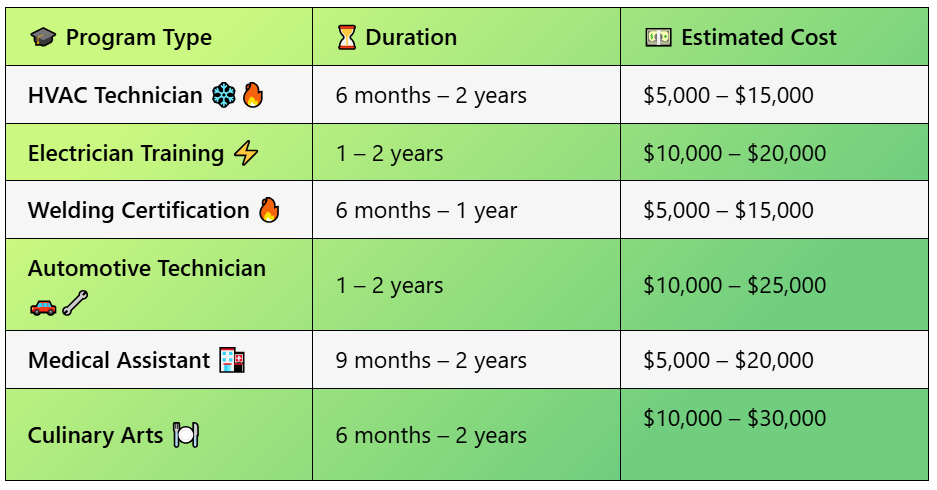
Top Trade Training Programs for High Demand Careers
Trade Training Programs are an excellent choice for those seeking stability and growth in their careers. These vocational training programs equip students with practical skills for high-demand jobs across various fields, including healthcare, skilled trades, and technology. Here are some top trade school programs that lead to rewarding opportunities:
- Healthcare Programs: With an aging population, careers in healthcare are booming. Programs like nursing, medical assisting, and dental hygiene are in high demand and allow you to make a significant impact on people’s lives.
- Skilled Trades: Electricians, plumbers, and HVAC technicians are vital in every community. These programs blend classroom learning with hands-on experience, ensuring graduates are job-ready.
- Information Technology: As technology evolves, so does the need for skilled IT professionals. Programs in cybersecurity, network administration, and software development are increasingly popular and lucrative. Choosing the right trade school program can set you on a successful path.
Benefits of vocational training include:
- Shorter Duration: Many programs can be completed in a year or less, enabling quick entry into the workforce.
- Hands-On Experience: Trade schools focus on practical skills, boosting your confidence.
- Job Placement Assistance: Many institutions help graduates find employment, easing the transition into the workforce.
In summary, trade school programs offer a viable alternative to traditional college, focusing on in-demand skills and building a future.
Unlock your potential with online degrees—Learn more!
Exploring the Benefits of Trade School Education
Exploring the benefits of trade school education can unlock numerous opportunities for those eager to kickstart their careers. Trade schools, or vocational training programs, provide specialized education that prepares students for specific trades. This hands-on approach equips them with practical skills and enhances their employability in a competitive job market.
Fields like plumbing, electrical work, and automotive technology are in high demand, offering graduates a clear path to stable employment. A significant advantage of trade school programs is their shorter duration compared to traditional four-year degrees.
Many vocational training programs can be completed in just one to two years, allowing students to enter the workforce sooner. Additionally, trade schools typically have lower tuition costs, making them a financially smart choice. Here are some key benefits of pursuing a trade school education:
- Focused Curriculum: Students learn specific skills tailored to their field, ensuring job readiness upon graduation.
- Hands-On Experience: Programs often include internships or apprenticeships, providing invaluable real-world experience.
- Job Placement Assistance: Many trade schools offer career services to help graduates secure jobs.
- High Earning Potential: Skilled trades often come with competitive salaries, sometimes surpassing those of traditional degree holders.
- Job Security: Many trades are essential services, leading to consistent demand for skilled workers.
By choosing a trade school program, students can acquire the skills needed to thrive in their careers while benefiting from a more affordable and efficient education.
How to Choose the Right Trade School Program for You
Choosing the right trade school program can be daunting, but it doesn’t have to be. With numerous options available, it’s crucial to find a program that aligns with your interests and career aspirations. Trade school programs provide hands-on training in various fields, making them ideal for those eager to enter the workforce quickly.
So, how do you identify the right fit? Begin by reflecting on your interests and strengths. Consider questions like: What subjects did I enjoy in school? What hobbies could translate into a career? Once you have clarity, research vocational training programs that suit your skills. Here are some popular fields to explore:
- Healthcare: Programs such as nursing or dental hygiene are in high demand and offer fulfilling careers.
- Skilled Trades: Electricians, plumbers, and HVAC technicians are always needed, often with great pay.
- Information Technology: With the tech industry thriving, programs in coding or cybersecurity can lead to lucrative jobs.
- Culinary Arts: If cooking is your passion, consider a program that can help you turn it into a profession.
After narrowing your options, visit schools, speak with instructors, and connect with current students to gain insights into the program’s quality and culture. The right trade school program should prepare you for a job and inspire you to excel in your chosen field.
In-Demand Trade School Programs for a Successful Future
In today’s fast-paced job market, choosing the right path can be daunting. Trade school programs offer a practical solution for those looking to jumpstart their careers without the lengthy commitment of a traditional four-year degree. These vocational training programs are designed to equip students with the skills needed for in-demand jobs, making them a smart choice for many.
Whether you’re interested in hands-on work or technical fields, there are numerous options available that can lead to a successful future. Some of the best trade school programs focus on industries that are currently experiencing growth. Here are a few standout options:
- Healthcare: Programs like nursing or medical assisting are in high demand, offering stable job prospects and the chance to make a difference in people’s lives.
- Skilled Trades: Fields such as plumbing, electrical work, and HVAC are essential and often pay well. These roles require specialized training, which trade schools provide effectively.
- Information Technology: With the tech industry booming, programs in cybersecurity, coding, and network administration are increasingly popular. Graduates can find lucrative positions in various sectors.
- Culinary Arts: For those with a passion for food, culinary programs can lead to exciting careers in restaurants, catering, and beyond.
The Cost of Trade School Programs: What to Expect

Understanding the cost of trade school programs is essential when considering your options. Trade schools, or vocational training programs, provide specialized education that can lead to fulfilling careers without the high expenses associated with a four-year college.
Typically, students can expect to invest between five thousand and twenty thousand dollars for a complete program, depending on the field and location. This investment often leads to high-demand jobs shortly after graduation. Here are some key insights regarding costs:
- Tuition Fees: These can vary significantly by program and institution. For instance, a plumbing program may cost around ten thousand dollars, while HVAC training could be slightly less.
- Additional Expenses: Remember to account for books, tools, and supplies, which can add another one to three thousand dollars to your total cost.
- Financial Aid Options: Many trade schools provide financial aid, scholarships, or payment plans to help manage costs.
Exploring these options can make education more affordable. Ultimately, the value of vocational training programs extends beyond cost. Graduates frequently secure jobs with salaries that surpass those of traditional college graduates, making trade schools an appealing choice for many.
Job Placement Rates for Trade School Graduates
When evaluating the best trade school programs, job placement rates for graduates are a crucial factor. These rates reveal how effectively a vocational training program prepares students for the workforce. High placement rates suggest that the program not only imparts relevant skills but also connects students with potential employers.
Many trade schools collaborate with local businesses, providing students with access to internships and job opportunities immediately after graduation. Here are some key benefits of high job placement rates in trade school programs:
- Industry Connections: Schools with strong placement rates often have established relationships with employers, leading to job offers for graduates.
- Real-World Experience: Programs frequently include hands-on training and internships, giving students practical experience that employers value.
- Career Support Services: Trade schools typically offer career counseling, resume workshops, and interview preparation, enhancing a graduate’s employability.
For example, graduates from a reputable plumbing vocational training program may secure employment within weeks of completing their training, thanks to the school’s strong network and job placement services. This example underscores the importance of selecting a program with a proven track record in helping students find jobs in their fields. Ultimately, the right trade school program can pave the way for a successful career.
Unlock your potential with online degrees—Learn more!
Hands-On Learning in Trade School Programs
Trade school programs provide students with hands-on learning experiences tailored for specific careers. Unlike traditional college paths, these vocational training programs emphasize practical skills and real-world applications. For example, students in automotive programs spend considerable time working on actual vehicles, gaining invaluable insights that enhance their confidence and skill development. These programs cater to a variety of interests and career goals. Some popular options include:
- Welding: A high-demand field with numerous opportunities in construction and manufacturing.
- Electrical Work: Essential for both residential and commercial projects, offering a solid career path.
- Culinary Arts: Ideal for those passionate about cooking and food service.
- Healthcare: Programs like nursing or medical assisting equip students with vital skills for a growing industry.
By opting for trade school, students gain specialized knowledge and benefit from shorter program lengths compared to traditional degrees. This allows them to enter the workforce sooner and often with less debt. The vocational meaning behind these programs is clear: they equip individuals with the necessary skills to thrive in their chosen fields, making them highly employable and ready to contribute to the economy.
Trade School Programs vs. Traditional College: A Comparison
When considering education paths, many people find themselves weighing the benefits of trade school programs against traditional college degrees. Trade schools, also known as vocational training programs, focus on equipping students with specific skills for particular careers. This hands-on approach often leads to quicker job placement and a more direct route to employment compared to the broader, more theoretical education offered by traditional colleges.
One of the standout benefits of trade school programs is their efficiency. Students can often complete their training in a year or two, allowing them to enter the workforce sooner. Here are some key advantages of choosing a trade school:
- Cost-Effective: Trade schools typically charge lower tuition fees than traditional colleges, making them a more affordable option for many students.
- Focused Curriculum: Programs are designed to teach practical skills directly related to a specific job, ensuring that graduates are job-ready.
- High Demand Careers: Many trade school graduates find themselves in high-demand fields such as plumbing, electrical work, and healthcare, where skilled workers are needed.
In contrast, traditional college often requires a broader education, which can lead to student debt without a guaranteed job. While both paths have their merits, trade school programs provide a clear, practical route to employment, making them an appealing choice for many.
Future Trends in Trade School Programs and Career Opportunities
Trade school programs are evolving to meet the demands of a rapidly changing job market, serving as gateways to lucrative and fulfilling careers. With technology advancing quickly, fields like healthcare, information technology, and skilled trades are experiencing a surge in demand. For example, the rise of renewable energy has created a need for trained technicians to install and maintain solar panels, highlighting how trade schools adapt to industry trends. Vocational training offers a variety of programs worth considering:
- Healthcare Programs: High demand for nursing and medical assisting.
- Information Technology: Booming fields in cybersecurity and software development.
- Skilled Trades: Constant need for electricians, plumbers, and HVAC technicians.
- Culinary Arts: Thriving food industry with creative career paths.
These programs not only provide practical skills but also lead to job security and growth opportunities. Moreover, trade schools emphasize hands-on experience, which is crucial in today’s job market. Students benefit from internships and apprenticeships that allow them to apply their learning in real-world settings.
This practical approach enhances education and makes graduates more appealing to employers. As industries evolve, trade school programs will remain essential for those entering the workforce with confidence. The future of vocational training is bright, with endless opportunities ahead.
Unlock your potential with online degrees—Learn more!
FAQs
-
What are trade training programs?
Trade training programs provide hands-on education and skills development for specific careers in skilled trades, such as welding, plumbing, electrical work, and HVAC. -
How long does it take to complete a trade training program?
Most programs take between a few months to two years, depending on the trade and whether it’s a certificate, diploma, or apprenticeship program. -
What are the benefits of choosing a trade career over a traditional college degree?
Trade careers often have lower education costs, shorter training periods, high demand, and competitive salaries without requiring a four-year degree. -
Are trade training programs available online?
Some programs offer online coursework, but most require in-person training for hands-on skills.




